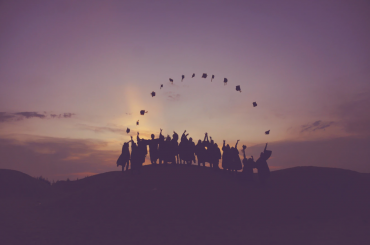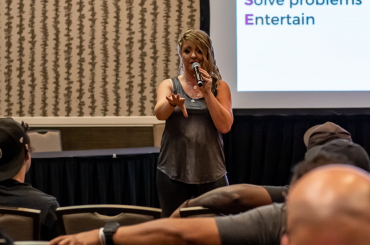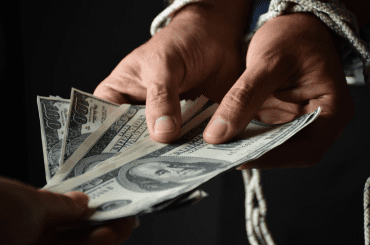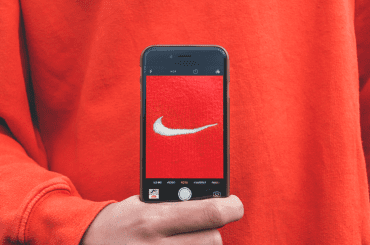By being aware of the needs and perspectives of wedding photographers, Missouri-based mobile Cole Coleman no longer uses high-end lighting effects.
“As a DJ, I understand the desire to show your brawn in lasers, moving head lights, etc.,” explains Cole, the owner of House DJ + Entertainment in De Soto, Mo. “However, as a business owner, I also understand that my desire should not outweigh the quality of my clients’ end product.
“With a photographer, it’s incredibly difficult to get great-looking pictures with spots, shapes and blotches on the couple as they dance, and this is exactly why I’ve entirely eliminated them from my setup.”
So, he’s adapted and since gone with alternative lighting solutions. “Nowadays, I simply use a set of color-wash lights to give the dancefloor an even-colored hue,” he says. “It works tremendously for myself, and my clients always have great pictures and great videos because of this practice – not to mention the great photographers we work beside.
“I’m not against moving heads, spots, lasers, etc. I think they’re very cool lights and I think they all have a time and a place; however, I personally don’t believe that a wedding is either.”
What lessons have mobile DJs learned from others who likewise work within the service industry? What have you learned from other wedding vendors, such as caterers and photographers and venues, that might have inspired us to adjust how our business operates?
David Mires (aka DJ Spynn) of Flash and Dance Photography & DJ Service in Berkley, Mass., says the most important thing he’s learned from watching other vendors is to be patient.
“My wife does wedding photography, and you need to have patience with drunk people,” he says. “I’ve learned by watching her.”
Over in Anaheim Hills, Calif., Ken Heath of DJ Ken’s Mobile Music says that by watching other DJs he’s learned not to nickel and dime his own clients.
“After seeing people try to extend into overtime for added dollars, I decided I didn’t like that,” he says. “I quote a fair price for the entire event.”
Minnesota-based mobile Eric Christensen agrees and says that he’s learned the hard way. “With caterers and hotels, it’s always imperative to coordinate beforehand with them,” says Christensen of Eclectic Entertainment in St. Paul, Minn. “Though, at the risk of sounding snarky, I’ve learned to place all my gear behind or next to the other vendors’ stations… like some DJs complain the photographers do to us.”
More seriously, Kenneth Bajdek of All Pro DJs in Plymouth, Ind., says that in order to set ourselves apart from other vendors, mobile DJs would do best simply to show up on time and look professional.
“Too many vendors show up late and don’t look professional,” says Bajdek. “Cargo shorts or yoga pants and flip-flops to a black-tie formal event doesn’t look professional.”
That thought is echoed by DJ Paul Carline, Jr., of Austin, Texas: “With other vendors I would say being punctual is imperative,” he says. “To be early is on time; to be on time is to be late.”
Neal Smith of Dandy DJ & Photo Booth in Murpheesboro, Tenn., goes one step further and says that mobiles should be present for the success of the entire event in any way they can—not just their own portion of the events.
“I worked with a bartender once, long ago, who pitched in hanging decor and setting up some various other things not related to his service, that not many—myself included, at the time—would have considered doing,” recalls Smith. “I noticed how he was there in complete service and going above and beyond in every way. It inspired me to take another look at myself and my approach, and to make some real changes for the better.
“I’ve learned to be there for the success of the entire event in every way I can—not just my portion of it.” Flexibility is the key for Bill Smith of Bill Smith’s Magic of Music in Durham, N.C. “I found out a long time ago,” he says, “that working with a vendor, like the hotel, and using their timeline for food service, works much better than trying to force my agenda on something I don’t control anyway.”
“I would actually review with them and adjust my schedule and they always liked that, and I learned this by watching other DJs get stressed out trying to control something out of their realm.”
There are many takeaways that non-DJ related industries and professionals have to offer, if we look closely enough, according to Artem Lomaz, founder and principal event host for New Jersey-based NinetyThree Entertainment.
“I often like to turn to non-DJ/entertainer professionals for an ‘outsider’s’ perspective,” says the Roxbury, N.J.-based Lomaz. “Personally, I’ve become good friends with a cinematographer, a private caterer and a photo-booth supplier—all of which are what I like to call ‘DJ-industry adjacent.’ They see various events as we do and often witness various performers in action, but see them from a different angle so to speak. This perspective allows for them to garner an understanding of audience feedback, from the sidelines.”
Lomaz says he’s also been fortunate to have become good friends with an award-winning comedy writer and performer he’s known since they were in their early teens.
“We constantly trade notes in regards to performance, preparation, audience reading, emotional expectations, social media and marketing,” he says. “Although perhaps unaware of it when he first began, as a writer and performer he now operates a self-branded business that he must maintain—like all of us—in order to compete in a highly competitive environment.
“Through the course of the friendship, we’ve witnessed and encouraged one another’s thriving pursuits, and continue to compare notes on seemingly unrelated industries. However, we’re both performers, in saturated industries, with increasingly lowered barriers to entry, with one simple task for each performance—make our audience/guests feel special.”
Lomaz says that he and his fellow entertainer both look to create an environment that allows for an inclusive and celebratory experience.
“Although my friend’s focus is on the uncomfortable, absurd and comical, the outcome desired is to make the participants in the process feel better than they did when they first walked in. Our techniques and approaches understandably vary, but our goal, at its core, is the same: Good vibes for all.
“Aside from performance, comes promotion and awareness. Much like the private entertainer role, the position of ‘comedy writer/comedian’ is also very desirable, and the attention to detail and constant creation necessity is often overlooked.”
Much like a business owner, Lomaz says that a writer or performer needs to make themselves known enough that others will want to share their work with their friends.
“We all want to find those influencers,” he says. “This requires consistent and share-worthy content. For content to be shared, it needs an elicited emotion from the viewer/consumer.
“Humor often triggers an emotion that people want to share. It is, however, like all art forms, a subjective art. Thus, finding the proper audience/target to cater to is essential, as it will help you create your best work. These are all takeaways that I’ve honed in on to help build my personal brand.”
Over the years, Mike Mahoney of M&M Entertainment in South Portland, Maine, says he’s attempted to develop a network of professionals who are in any way involved with events.
“I’ve learned from caterers, photographers, riggers, videographers, officiants, event planners, banquet captains, performers, lighting designers, bartenders and then some,” says Mahoney. “I’ve learned terms like BEO, F-Stop, Double Cheese and ISO. I’ve learned about lighting things up properly, about how video panels work, what color temperature is and even what diffusion is all about.
“I’ve baked cakes with bakers, cooked with friends who are chefs, and I’ve even learned how to make ice sculptures.”
Through networking, Mahoney says he’s been able to bring in nearly 50-percent of his business via word-of-mouth.
“I’ve even learned from other DJs and MCs of all types, from club to mobile to touring DJs to turntablists and others,” he says. “By taking a genuine interest in what they all do to prepare and plan for events from their angles, it’s helped me be a better professional when interacting with them at events we do for our clients.
“In terms of customer service, it’s allowed me to recommend amazing people, companies and services that are valued and appreciated as much as I am.”
Mahoney says his relationships with fellow vendors have been primarily formed and maintained mainly through his contributions to local chapters of event-based associations such as NACE, Wedding Network USA, ILEA, his local Chamber of Commerce, and Convention & Visitors Bureaus.
“By not only attending regularly, but even getting involved with the boards or committees,” he says, “I’ve been able to continue to grow and maintain my relationships with other professional members—mostly others who are upstream from us DJs.
“Networking is key to achieving this in business. It’s not all about your skillset and how well you do at your events—what you know—it’s also about capturing your ideal audience and clients with a tighter net—who you know.”








